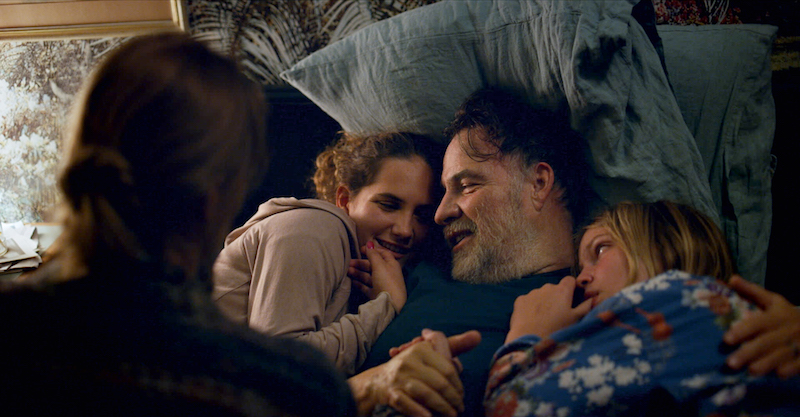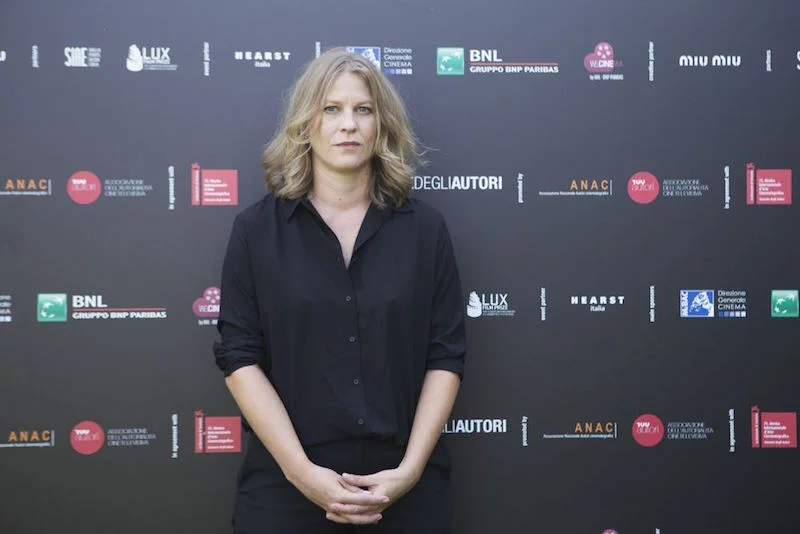Think back to the last time a film redefined love for you. That felt like a magical discovery then, didn't it? For me, cinema exists at its best when it does something that changes me -- and of course I want that change to be for the better.
In Claire Burger's touching follow up to her Cannes Camera d'Or winner 'Party Girl' -- which she co-directed with Marie Amachoukeli and Samuel Theis -- I found a new fatherhood role model. For a woman whose own father was at best unavailable throughout my teenage years and beyond, Burger's wondrous father figure Mario (played by the spellbinding Bouli Lanners) is a revelation and offers a sense of newfound hope. His quest to be a good father to the young Frida (the perfectly rebellious Justine Lacroix) and the teenage Kiki (cool and flirty Sarah Henochsberg) takes the audience on a journey of discovery along with the characters.
But 'C'est ça l'amour' is a multilayered film and so it's no surprise that, among quite a few strong and beautiful stories featured in this year's Giornate degli Autori line up, Burger's film ended up walking away with the top prize -- the GdA Director's Award.
Italian-American filmmaker Jonas Carpignano lead a jury of twenty-eight young film aficionados each from a different country in the European Union, accompanied to Venice by Karel Och, director of the Karlovy Vary Festival -- and they picked 'C'est ça l'amour'.
The jury's statement addresses the different themes explored by Burger's film, among them our search for identity as young adults, as well as male sensitivity, which isn't often displayed in movies today:
“An extremely personal film from the director Claire Burger, an extremely relatable piece on the different situations we face in our lives, whether we are dealing with a failing relationship, or having our heart broken for the very first time. We chose this film due to its tenderness and its craft, which director Burger is completely in control of.”
I caught up with Burger in Venice, at the Villa degli Autori, while a thunderstorm raged on in the background. We talked about her wonderful yet unorthodox choice of a leading man, the personal side of her story which feeds into the film itself and she even ended up asking me a great question.
How did you decide to make this film, as a follow-up to ‘Party Girl’?
Filmmaker Claire Burger
Claire Burger: In fact, it was very important for me — you’ve seen ‘Party Girl’ — the main character was a woman and she was really free and very strong and it was difficult for her to be a mother… And as a female director I didn’t want to think that I would always make films about women, as if my femininity makes me obliged to talk about women.
It was important for me artistically because I wanted to see if I could talk about a man and also I didn’t want to show a man with the masculinity we are very used to. I wasn’t raised by a man like that and the men around me are not like this. I have many friends, even the people I work with on films, the technicians are sometimes men but they are very sensitive. My father was in a way, you could say feminine. Because he was the one who wanted to take care of my sister and I, as my mother was not into maternity.
Is there a little autobiographical in this film?
Burger: Yes of course! ‘Party Girl’ was interesting for me because it was a way to explore what it is to be a woman and really struggle with the question of being a mother. Because my mother is like that, this is more about my father.
So the two films form a diptych of sorts?
Burger: Yes and I made a short about a family story like this but it was more about the children…
It’s really a triptych!
Burger: So it was really interesting for me, because I lived it and I believe in it, to show that it’s also difficult for a man to realize that “my children are growing older and they are going to leave me” and to be very down because you’ve been left.
He’s such a lovely father figure.
Burger: When I was young and my mother left me I was angry. But strangely I was angry at my father. Because I was thinking that she left because he was not good enough and I had a lot stupid and naive reason in mind. You know, when you are a teenager you are not able to understand all the complexities of love.
And now because I’m a grown up and I’ve left people, people have left me, I have another understanding of what love is, I’m more able to see what my father went through. And also to understand the beauty of the fact that he was taking care of us. Even if we were like tough… It was interesting for me to revisit this as a grownup and understand the situation. Not to say that the mother is not good…
She is not the antihero and he’s not a complete hero but this is a dysfunctional family like many…
Burger: Also, the film is not about a huge dramatic narrative, it’s not a pitch that you can say “wow”, it’s very common. But I thought it was interesting for me, for my work, to be very humble and take something very simple and explore what it is for each character. Make each character’s own truth and that be in conflict with the truth of the other, like life is, like families are, like love is…
Your leading man is an incredibly charismatic beautiful man who is not classically handsome. I love when a film makes me reexamine beauty. How did you arrive at this magnificent casting coup? He is spellbinding.
Burger: I was very used to working with non-professional actors — I often work in my own town with people who are from my hometown and are playing their own role in the story that was really inspired by them. But this time I wanted to try, maybe because it was also about my father and I couldn’t take him to play the role, I was interested in trying to explore what it’s like to work with a professional actor and I wanted someone who was close to the territory where I was filming and Bouli [Lanners] is from Belgium in a place that is very close to the border too. It’s more like Belgian actors who are in French films that are closer to the people in my area than a Parisian.
Bouli also has a strong child quality like my father and a strong sensitivity. Because there is no strong revelation in the film I wanted us to love the character and feel close to him and Bouli has this big humanity, something very generous and very touching. It was not easy to find an actor this age that has this kind of femininity because it is present in young actors but then at the age of fifty you only have the stoic and masculine. I was very happy to have him.
I find male filmmakers are more intellectual about their choices and many times, they want to show the audience how smart they are. Your film doesn’t want to show how smart and what a great director you are. You are simply serving the story.
Burger: And do you think that’s a male and female thing?
I don’t know, maybe it’s a character thing?
Burger: But in a way there are many many men filmmakers and not enough women filmmakers to really see what is really different. So I couldn’t really say that women filmmakers work like this… But for me it was important to let my actors, my characters and my story in a way be more powerful than me. I didn’t want to work by trying to show how I was able to make the camera movement or what it was my pictorial statement. I’m really more interested in making the characters stronger than the director. I don’t know if it’s a woman thing, I think it’s a social thing more.
Meaning?
Burger: Maybe I’m saying something stupid but I come from a really small town, around me were only lower class people, and I don’t know, I think I feel humble. I don’t have the feeling that I’m this very intellectual, very fancy Parisian director — even if I live in Paris.

